- Home
-
Overview
- Study Guide
- The Single Most Important Idea
- Mission Statement
- War Is Not Inevitable keynote speech
- Capstone Essay: "To Abolish War"
- An Action Plan
- The Nine Cornerstones
- How Far We Have Already Come
- The Secret Ingredient
- The Vision Thing
- How Long It Will Take
- What You Can Do
- The AFWW Logo Explained
- Examples of War Expenses
- Biological Differences
- What Makes People Happy
- Map of Non-warring Cultures
- Cornerstones
- Videos
- Books
- Blog
- Project Enduring Peace
- About
- Related Projects
- Contact
|
Man-the Warrior or Humans-the-Cooperators - by Judith Hand The “man-the-warrior” hypothesis, the one science has embraced for quite some time, tilts us heavily toward pessimism. It’s not a particularly happy image. But the times, they are a’changin.’ This view of humanity’s deep past is being seriously questioned by recent data and reanalysis of old data. That’s one of the great beauties of science: the ability to reassess.
For decades the view of human ancestry, and of the origins of war, have been shaped by reference to what was thought to be our closest relative, the common chimpanzee (Pan troglodytes). The general thinking was that our common ancestor way back when must have had behavior and drives much like what we would see in common chimpanzees, and so we had much to learn by observing our close kin in the wild. Even before someone saw the first case of a gang of male chimpanzees sneaking up on another chimpanzee from a different group to kill it, many students of human evolution had bought into what has been called the “man-the-warrior” model of human evolution. Read more here.
0 Comments
Global Women Leaders Flex Security Muscles in New York City Judith Hand  Jumeirah Essex House Hotel Jumeirah Essex House Hotel On November 15-17 of 2007, over seventy five women—current and former heads of state, influential ministers, and leaders of inter-governmental and non-governmental organizations—were invited to the first International Women Leaders Global Security Summit at the Jumeirah Essex House Hotel in New York City. This may prove to be a pivotal historic event. The stated goal was to provide women leaders a forum to discuss, evaluate, and endorse meaningful strategies for global security. For reasons explained in two books and on this website, the creation and maintenance of social stability is a priority of special importance to women, and we have arrived at a moment in history where many women have sufficient influence and power to begin to address security issues with authority. (Hand 2003, Women, Power and the Biology of Peace; 2018 War and Sex and Human Destiny) Perhaps we have reached an historical "tipping point." Recently, in an exchange with talk show host Barry F. Seidman (Equal Time for Freethought; WBAI-NY), who describes himself as a secular humanist, the subject of paradigm shift came up. The host is an advocate of libertarian-socialism (anarchism), a good man who envisions a future for our species much like that envisioned by AFWW: egalitarian, just, less violent, ecologically sustainable, and free of war. He sees us trapped in endless cycles of war, polluting and denuding our environment at a perilous rate, and challenged by the juggernaut of global warming. In other words, like most well-read and broadly-informed people, he sees the mess we've gotten ourselves into. When questioned by me about whether or not he used his voice, via his radio program and interviews with experts, to encourage the global empowerment of women as rapidly as possible in order to achieve his vision, his response was, No. "Unless we change the current capitalist system, adding more women to government won't make any difference." Ah, I thought, this very enlightened man of good will, like most men, women, well-meaning organizations, and governments, has it the wrong way 'round. Let me explain. Maybe you agree with him. Maybe you also feel that to fix what's wrong with us, other issues command first priority. You may agree with him that the crucial focus is to change "the system," and then there will be time to get more women involved. 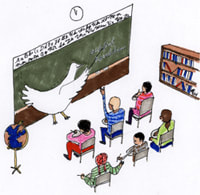 Or perhaps you feel the place to start is by teaching people, young and old, one person at a time, how to resolve their conflicts nonviolently, how to live in peace as a daily practice. When we do that, the assumption seems to be, men everywhere, even those in the Muslim world, will then peacefully accept women as equals and will embrace women as full partners, in our homes, governments, and in global decision-making.  Or maybe you feel that paradigm shift necessitates tackling the war industry head-on, ending the use of land mines, cluster bombs, and nuclear weapons—and working forward from there. Or maybe your focus is on ending poverty. Or spreading the enlightenment and freedom that comes with liberal democracy. In other words, you too may think that empowering women is a good thing, but something that can wait until after we fix the really important problem/s, after we fix the really big barriers to positive change in human history. An essay by Dr. Judith L. Hand (2010)  Sarah Palin Sarah Palin In 2005, I established a website dedicated to abolishing war. Among a great many necessities, an important key element is to have empowered women as leaders and followers. Women, it is argued, are the natural allies of nonviolent conflict resolution, and leaving them on the sidelines in a campaign to entirely end the practice of war guarantees failure. Reading this or hearing me speak, insistent skeptics often throw out the challenge, “If women are allies of nonviolence, how do you explain Sarah Palin? And what’s with Ann Coulter?” Years ago, when people were working, unsuccessfully as it turns out, to pass an amendment to the U.S. Constitution that would guarantee to women the rights guaranteed to men, people often asked me, “How do you explain Phyllis Schlafly?” Schlafly fought hard to defeat the amendment; she was the poster-girl for keeping women in their traditional places and hampered by traditional limitations (although she did not actually practice what she preached, being extremely active outside the home).  Phyllis Schafley Phyllis Schafley Rather than skeptical, the tone of the questions at that time tended to be puzzled: how to explain women like Schlafly who dug in their heels to prevent change, even change that would give their mothers, sisters, and daughters rights equal to those granted to men. The behavior of these women seemed so counterintuitive. Shouldn’t all women want women to have equal pay for equal work, equal ability buy stocks without a husband’s okay, equal access to the money available for sports programs in schools, and so on? Why should women have to fight every possible inequality one by one, with the ever-present possibility of loosing any given right should state legislators change their minds when an amendment could make sexual equality set law in all states for all time? Back then I had a couple of answers, based mostly on personal experience, answers I still consider valid. In the years since, I’ve explored the subjects of social conflict, war, and male/female gender differences with respect to physical aggression. This produced a much clearer understanding of this seeming puzzle of women-as-conservatives phenomenon, even when it keeps them subordinate to men or leads them to support a president who wants to wage preemptive war. My answers now are more inclusive and based on biological, anthropological, and psychological studies. Albert Einstein famously said, "Insanity is doing the same thing and expecting a different result." It’s pretty certain that if we want to abolish war, for example, the last 10,000 or so years of history indicate that we're going to have to do something different. Here’s something very different: citizens pushing nonviolently for any kind of social transformation should consider putting women on the front lines. In Egypt during the 2011 Arab Spring uprising TV footage of surging masses of men leave the impression that the protestors were virtually all male, but this is in part because the men push themselves into the spotlight. Articles from reporters indicate that many women were not only present in Tahrir Square, they made significant contributions. It is arguably possible that the presence of a critical mass of women was in no small part responsbile for the demonstrators’ consistent peacefulness. Here is a radical proposition, but one worth consideration. Movements committed to pressuring for any social transformation using nonviolence should, whenever feasible, adopt a controversial but potentially very powerful change in tactics. Rather than mobilize men as the majority participants of marches, sit-ins, demonstrations, work-stoppages and so on, women should be the protestors. 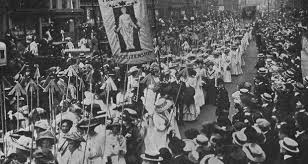 Women's Suffrage March Women's Suffrage March Why? Because this immediately alters the conflict chemistry. The context is no longer a male contest of wills, which provokes emotions that easily escalate into violence. Instead, men who are the enforcers of the system are facing, and threatening, determined women: their mothers, grandmothers, sisters, and daughters. This single change maximally reduces the likelihood that the situation will turn violent. It does not guarantee it. As with all nonviolent direct actions, there will be risks for the activists, perhaps even arrest or beatings. If their opposition is led by a brutal dictator—a Hitler or a Kadafi—the risks may be to life itself. But women roused to a worthy cause do not lack courage.  Forcefeeding a suffragist. Forcefeeding a suffragist. In a nonviolence movement, keeping a protest from turning violent greatly magnifies the protestors’ power. As an added plus, it does not require laborious training of men in how to respond nonviolently when attacked, something that is essential to well-planned nonviolent protests where men are going to be the chief protestors; women are already strongly inclined to avoid turning physically violent. Consider that the successful U.S. women’s movement to secure the vote was nonviolent...but required determined and courageous women. As a recent, real-world example, study the peace campaign of the Liberian Women’s Peace Movement. Liberian Women Rock! 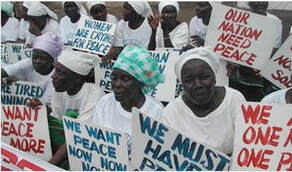 Liberian Women's Peace Movement Liberian Women's Peace Movement Liberia isn't a "natural" African nation. It was formed when freed slaves from America returned to Africa at the end of the U.S. civil war. This movement didn't last very long, but it resulted in a country with a constitution, a democracy, and a name. Things did not go well. Over time, Liberia degenerated into a tyrannical dictatorship, most recently under the presidency of Charles Taylor. In 1999, a "second civil war" broke out. This set off the barbaric use of rape, mutilation, and murder, something seen elsewhere in Africa as well. Some studies indicate that 90% of Liberian girls and women would experience rape in their lifetime. After eight years of this mayhem, social activist Leymah Gbowee had a dream one night and when she awoke, she decided to call the women of her church together to pray for the end of the war. 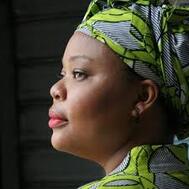 Leymah Gbowee Leymah Gbowee By the end of the meeting the women had pretty much decided that something more than prayer was necessary. They decided to begin a campaign, a nonviolent campaign, in which they would seek to have an audience with Taylor, to convince him to join in peace negotiations. They would wear white T-shirts and turbans, they would stake out the road along which his caravan drove each day, and they would stake out the market. They would not give up until Taylor conceded to see them. Then a woman stood up to say that, the fact was, she wasn't a Christian. She was a Muslim, and she knew a lot of Muslim women who felt exactly the same way. Women of the two faiths joined together and began their "action." It was said of Charles Taylor, who put on a great show of piety, that he was so evil that he could "pray the devil out of hell." An inspiring film entitled "Pray the Devil Back to Hell," documents how things worked out, including how the women of Liberia held the warring men hostage until a peace agreement was signed. AFWW provides an educational viewing guide of the film that presents in detail at each stage of the film how the women's efforts demonstrate the best practices for ANY nonviolent social change movement. The film also shows how the women were supported by men of good will who were also eager to see the bloodshed cease. The support of good men was also the case with the U.S. suffragists; for example, a great deal of the money for the movement came from men, most of the women having no money of their own. But the women were the front lines. 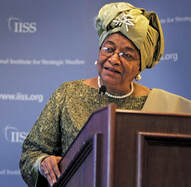 Ellen Johnson-Sirleaf Ellen Johnson-Sirleaf But that's not the end of the Liberian story. When it came time for the next election, the women of Liberia helped elect Harvard Educated Ellen Johnson-Sirleaf as the first elected women head of state on the African continent. At this time (2009), Johnson-Sirleaf and Liberia's men and women struggle to build on this wonderful transformation in a land that is bitterly poor and crippled with a debilitating history of strife. But clearly, a determined and savvy application of nonviolence could cut through a nasty, brutal, violent civil war even in this day and age. And such a movement can be achieved by determined women who have the support of men of good will. |
Follow Me on Facebook
If you'd like to read my take on current affairs, or get a sense of what amuses me or I find educational or beautiful, do a search and follow me, Judith Hand, on Facebook. About the AuthorDr. Judith L. Hand. Dr. Hand earned her Ph.D. in biology from UCLA. Her studies included animal behavior and primatology. After completing a Smithsonian Post-doctoral Fellowship at the National Zoo in Washington, D.C., she returned to UCLA as a research associate and lecturer. Her undergraduate major was in cultural anthropology. She worked as a technician in neurophysiology laboratories at UCLA and the Max Planck Institute, in Munich, Germany. As a student of animal communication, she is the author of several books and scientific papers on the subject of social conflict resolution.
Categories
All
Archives
November 2019
|
A Future Without War
Believe in it. Envision it. Work for it.
And we will achieve it.
Believe in it. Envision it. Work for it.
And we will achieve it.
AFWW is continually developed and maintained by Writer and Evolutionary Biologist Dr. Judith Hand.
Earth image courtesy of the Image Science & Analysis Laboratory, NASA Johnson Space Center. Photo Number AS17-148-22727 eol.jsc.nasa.gov
©2005-2019 A Future Without War. All rights reserved. Login
Earth image courtesy of the Image Science & Analysis Laboratory, NASA Johnson Space Center. Photo Number AS17-148-22727 eol.jsc.nasa.gov
©2005-2019 A Future Without War. All rights reserved. Login
- Home
-
Overview
- Study Guide
- The Single Most Important Idea
- Mission Statement
- War Is Not Inevitable keynote speech
- Capstone Essay: "To Abolish War"
- An Action Plan
- The Nine Cornerstones
- How Far We Have Already Come
- The Secret Ingredient
- The Vision Thing
- How Long It Will Take
- What You Can Do
- The AFWW Logo Explained
- Examples of War Expenses
- Biological Differences
- What Makes People Happy
- Map of Non-warring Cultures
- Cornerstones
- Videos
- Books
- Blog
- Project Enduring Peace
- About
- Related Projects
- Contact




 RSS Feed
RSS Feed